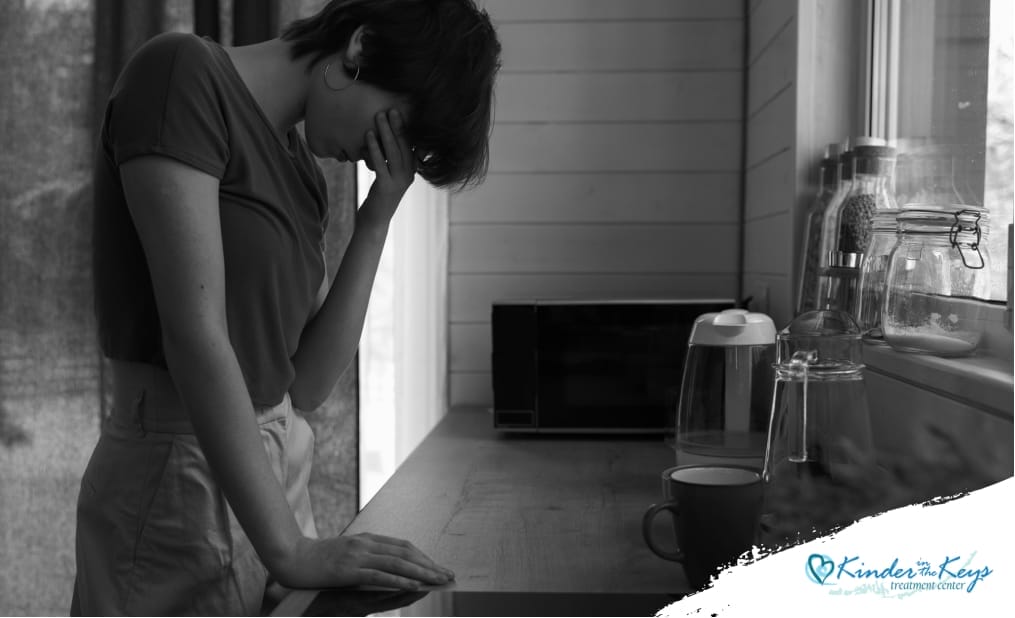Sometimes, life can feel like it’s crashing down around you, leaving you wondering if what you’re experiencing might be a mental health breakdown. Many people face moments when their emotional burdens feel too heavy to carry alone, and reaching out to understand what’s happening is not just brave—it’s the first step on your path to healing.
What’s happening is a mental breakdown, often referred to as a nervous breakdown. They can be scary. But they can also be helped. And you won’t deal with it forever.

Understanding Nervous Breakdowns
Have you ever felt like everything in your life was spiraling beyond your control? Like the weight of your emotions and responsibilities became so overwhelming that you could barely function? This is closer to what mental health professionals call a “mental breakdown”—though you might be surprised to learn that this isn’t actually a clinical term.
While there’s no official medical definition, mental health professionals often describe a mental breakdown as a period of intense mental and emotional distress that temporarily interrupts your ability to function in daily life.
A nervous or mental breakdown is very different from the everyday stress we all experience. We all have days when work is overwhelming or family responsibilities pile up, and we feel stressed.
But a mental health breakdown goes deeper. It’s when those feelings become so intense that simple tasks like getting out of bed, making decisions, or interacting with others feel impossible. You might find yourself unable to work, maintain relationships, or take care of basic needs.
Let’s clear up some misconceptions because there are plenty.
First, having a breakdown doesn’t mean you’re “crazy” or “weak” – far from it. It’s often a sign that you’ve been incredibly strong for too long, carrying burdens that would be heavy for anyone to bear. Second, it’s not something that only happens to certain types of people. Mental health breakdowns can affect anyone, regardless of their background, success level, or apparent resilience.
The most important thing to understand is that a breakdown, while incredibly challenging, is not a permanent state. Think of it as your mind and body’s urgent message that something needs to change. With proper support and care, recovery isn’t just possible – it’s the most common outcome. Many people emerge from this experience with better self-awareness, stronger boundaries, and healthier coping strategies than they had before.
Recovery looks different for everyone, but it’s a lot like rebuilding a house after a storm. Sometimes, you need to start with the foundation and work your way up, brick by brick. This might mean working with mental health professionals, learning new coping skills, making lifestyle changes, or even taking time in a supportive environment like a residential treatment center. The key is remembering that asking for help isn’t a sign of weakness—it’s often the first step toward getting stronger.

Common Triggers and Risk Factors
Understanding what can lead to a mental health crisis is crucial because these challenges often build up gradually over time. While everyone’s experience is different, certain life situations and circumstances tend to put more strain on our mental well-being.
- Chronic Stress and Burnout: This occurs when you’ve been pushing yourself too hard for too long, feeling like you’re constantly running on empty with no chance to recharge. Think of it as your internal battery being consistently drained without getting properly recharged.
- Major Life Changes and Transitions: Even positive changes like getting married, having a baby, or starting a dream job can put immense pressure on your mental health. These transitions often require significant emotional energy and adjustment, which can deplete your mental reserves.
- Relationship Difficulties: Whether it’s a divorce, family conflict, or the breakdown of a close friendship, relationship challenges can shake our emotional foundation and sense of security. The loss of support systems during these times can make us particularly vulnerable.
- Work-Related Pressures: Toxic work environments, impossible deadlines, and job insecurity can create a constant state of anxiety and overwhelm. When work stress follows you home and interrupts your sleep, it’s particularly damaging to your mental health.
- Trauma and Unresolved Emotional Experiences: Underlying mental health conditions, past traumatic events leading to post-traumatic stress disorder, other anxiety disorders, or childhood experiences that haven’t been properly processed can create emotional vulnerabilities that surface during times of prolonged stress. These unresolved experiences often compound current life stressors.
- Physical Health Challenges: Chronic illness, persistent pain, or ongoing medical issues can wear down both your body and mind. The constant struggle with physical health can drain your emotional resources and make it harder to cope with other life stressors.
Recognizing the Warning Signs of a Nervous Breakdown
Sometimes, a mental health breakdown doesn’t happen suddenly—it often sends signals along the way. Learning to recognize these first signs of a nervous breakdown can help you or someone you care about get support before reaching a crisis point.
Emotional Signs
Your emotional world might feel like it’s in constant turmoil. You might find yourself crying more easily, feeling irritable without clear reason, or experiencing intense anxiety that comes in waves. These overwhelming feelings can shift quickly, making you feel like you’re on an emotional rollercoaster you can’t control.
Physical Changes
Your body often signals mental health issues before your mind fully registers it. You might notice changes in your sleep patterns—either sleeping too much or lying awake at night with racing thoughts. Your appetite might disappear, or you might find yourself stress eating. Physical symptoms, like exhaustion, become a constant companion, even after a full night’s sleep.
Behavioral Shifts
When your mental health is struggling, your usual patterns often change. You might start canceling plans with friends, pulling away from activities you once enjoyed, or finding it hard to keep up with basic daily tasks like doing laundry or grocery shopping. Even simple decisions might feel overwhelming and paralyzing.
Cognitive Difficulties
Your mind might feel like it’s working against you. Concentrating on work becomes increasingly difficult, and you might catch yourself reading the same paragraph multiple times without absorbing anything. Your thoughts might race uncontrollably, or you might experience brain fog that makes even simple tasks feel complex.
Impact on Daily Life
These changes don’t exist in isolation – they ripple through every aspect of your life. Relationships might become strained as you struggle to maintain connections or explain what you’re going through. Work performance often suffers, and simple daily routines like getting ready in the morning might start to feel insurmountable.

The Role of Professional Support
Taking the step to seek professional help isn’t a sign of weakness – it’s quite the opposite. It shows remarkable self-awareness and courage to acknowledge when you need support. Many people worry that seeking help means they’ve failed somehow, but mental illness professionals understand that reaching out is one of the bravest decisions you can make.
When you first reach out for support, you’ll typically have an initial consultation where you can share what’s troubling you in a safe, confidential space. Your mental health professional will work with you to understand your specific situation and develop a treatment plan tailored to your needs.
This might include regular therapy sessions, medication if appropriate, or referrals to other specialists who can support different aspects of your recovery. It’s normal to feel nervous about this first step but remember that these professionals have dedicated their lives to helping others navigate similar challenges.
For some people, a residential mental health facility offers the most comprehensive path to recovery. These structured environments provide a chance to step away from daily stressors and focus entirely on healing. In residential treatment, you’ll have access to round-the-clock support, specialized therapy programs, and a community of people who understand what you’re going through.
The structured routine, combined with various therapeutic approaches and wellness activities, creates an ideal environment for deep healing and developing new coping strategies. This intensive level of care can be particularly beneficial when you’re feeling overwhelmed by trying to manage everything on your own.
Creating a Recovery Plan
Recovery from a mental health breakdown isn’t a one-size-fits-all journey—it’s a personalized path that combines several important elements working together. Think of it like building a sturdy house: a strong foundation, reliable support structures, and careful attention to detail.
Professional support typically forms the cornerstone of recovery. This might include regular therapy sessions where you can process your experiences and learn new coping tools, medication management if needed, or specialized treatments like EMDR for trauma. Your treatment team will work with you to find the right combination of approaches that resonate with your specific needs and circumstances.
Just as crucial as professional help is building a reliable support network. This means identifying people in your life who can offer different types of support—maybe it’s a friend who’s great at listening without judgment, a family member who can help with practical tasks when things feel overwhelming, or a support group where you can connect with others who truly understand your experience.
Remember, you don’t need to share every detail with everyone, but having a few trusted people in your corner can make a world of difference.
Crafting your recovery plan should also include practical strategies for maintaining mental wellness in your daily life. This means developing healthy coping mechanisms—like deep breathing exercises, journaling, or mindfulness practices—that you can turn to when intense stress builds up. It also involves making lifestyle changes that support your mental health: establishing a consistent sleep schedule, incorporating regular movement into your day, eating nourishing foods, and setting boundaries to protect your energy.
As you work on your recovery, it’s important to set realistic expectations. Healing isn’t usually a straight line upward—it often includes ups and downs, steps forward, and occasional steps back. Some days will feel easier than others, and that’s completely normal.
The goal isn’t to never struggle again; it’s to build resilience and develop tools so that when challenges arise, you’re better equipped to handle them. It’s like learning to dance in the rain rather than waiting for the storm to pass completely.
Taking the First Step Toward Healing
A mental health breakdown can feel like the darkest chapter of your story, but it doesn’t have to be the end—in fact, it can be the beginning of a transformative journey toward better mental health. Remember that seeking help isn’t just an option, it’s a powerful choice that opens the door to recovery and renewed well-being.
Whether you choose outpatient therapy, residential treatment, or a combination of support services, know that there are compassionate professionals ready to walk alongside you on your path to healing, and with the right support and tools, you can emerge stronger and more resilient than before.
